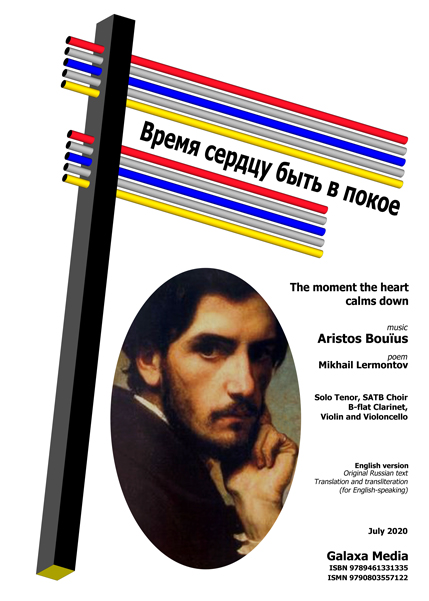

Время сердцу быть в покое
The moment the heart calms down
The moment the heart calms down
— On a poem by Mikhail Lermontov —
Researchers attribute the model of love-philosophical texts from 1832 to the 'Ivanovo cycle' - a series of poems by Lermontov, influenced by the passion he felt for Natalia Ivanova. The motif of the guarantees of love, which plays the main role in the poem The moment the heart calms falls in the pattern of its disharmony in relationships, when the thirst for happiness turns into deceived hope, betrayal and blame.
As a specific source that influenced the ideological content of the first stanza of this poem, a poem Byron made on the day of his 36th birthday is mentioned. The romantic motifs of cardiac deafness and forgetting feelings , parting in love and hope , appointed by Lord Byron, attracted the young Lermontov.
The lyrical hero reports the onset of cooling of the feelings of love and resorts to the image of the heart. The excitement of "unreasoning passion" is replaced by time of rest, in which the calming experiences reflect only the events that have passed.
In the two following verses, a new original theme of resentment, protest and reproaches addressed to the former mistress appears. Allegations of cruelty and arrogance are heard. Significantly, the female image is not denied the ability to love, but the heroine, indicated by the lyrical 'you', is trying for some reason to hide her 'heartache', fearing a resurgence of love.
The artistic space of the work consists of two landscape sketches and the laconic mention of the sea, incidentally born in the first verse, precedes the appearance of the final detailed image: boulders on the coast, separated by the elements, belong to the images of the creative system that Lermontov evokes. The poet is drawn to the idea of a deep intimate connection between the two principles, which lies behind the visual divisions. With a symbolic landscape, the poet draws a parallel between the image of nature and the hero's experiences.
This lied is intended to be sung in Russian. The score contains a meticulous transliteration as well as a pronunciation guide for English singers who do not speak Russian. For a good understanding of the text, a translation has been added in the score (see also below).
As a specific source that influenced the ideological content of the first stanza of this poem, a poem Byron made on the day of his 36th birthday is mentioned. The romantic motifs of cardiac deafness and forgetting feelings , parting in love and hope , appointed by Lord Byron, attracted the young Lermontov.
The lyrical hero reports the onset of cooling of the feelings of love and resorts to the image of the heart. The excitement of "unreasoning passion" is replaced by time of rest, in which the calming experiences reflect only the events that have passed.
In the two following verses, a new original theme of resentment, protest and reproaches addressed to the former mistress appears. Allegations of cruelty and arrogance are heard. Significantly, the female image is not denied the ability to love, but the heroine, indicated by the lyrical 'you', is trying for some reason to hide her 'heartache', fearing a resurgence of love.
The artistic space of the work consists of two landscape sketches and the laconic mention of the sea, incidentally born in the first verse, precedes the appearance of the final detailed image: boulders on the coast, separated by the elements, belong to the images of the creative system that Lermontov evokes. The poet is drawn to the idea of a deep intimate connection between the two principles, which lies behind the visual divisions. With a symbolic landscape, the poet draws a parallel between the image of nature and the hero's experiences.
(Based on an unsigned analysis of this poem on the Russian site: pishi-stihi.ru - the translation is mine)
This lied is intended to be sung in Russian. The score contains a meticulous transliteration as well as a pronunciation guide for English singers who do not speak Russian. For a good understanding of the text, a translation has been added in the score (see also below).
Aristos
P.S .: Transliteration means literally changing the letters of the Cyrillic alphabet more or less into our Latin letters. Transcription means that when rendering the text in Latin characters, the proper pronunciation is also included. Example: "большой" you know from the theater in St. Petersburg, the Bolshoï Theater. This is an (almost complete) transliteration. For a transcription this would be "Baljšoi" because:
A) syllables with an o in Russian words that have no accent, are pronounced as a. You can already feel it coming: the accent on this word is on the second syllable,
B) because of the j behind the l, that l is no longer harsh in pronunciation but softer,
C) because a š is a symbol of the sh in for example the word sheet.
Seems complicated, but in the end there are only a few rules for singers to learn to pronounce Russian as flawlessly as possible - in addition to the musical memory, there is still room for the lyrics!
A) syllables with an o in Russian words that have no accent, are pronounced as a. You can already feel it coming: the accent on this word is on the second syllable,
B) because of the j behind the l, that l is no longer harsh in pronunciation but softer,
C) because a š is a symbol of the sh in for example the word sheet.
Seems complicated, but in the end there are only a few rules for singers to learn to pronounce Russian as flawlessly as possible - in addition to the musical memory, there is still room for the lyrics!
The poem
1Время сердцу быть в покое
от волненья своего
с той минуты, как другое
уж не бьётся для него.
2
Но пускай оно трепещет,
то безумной страсти след,
tак всё бурно море плещет,
хоть над ним уж бури нет!
3
Неужли ты не видала
в час разлуки роковой,
как слеза моя блистала,
чтоб упасть перед тобой?
4
Ты отвергнула с презреньем
жертву лучшую мою,
ты боялась сожаленьем
воскресить любовь свою.
5
Но сердечного недуга
не могла ты утаить.
Слишком знаем мы друг друга,
чтоб друг друга позабыть.
6
Так расселись под громами,
видел я, в единый миг.
Пощаженные веками
два утеса бреговых.
7
Но приметно сохранила
знаки каждая скала,
что природа съединила,
а судьба их развела.
The translation
1The moment the heart calms down
of excitement and unrest
is when no other heart
beats anymore for him.
2
But still, it keeps beating,
in the wake of unreasoning passion,
like every sea storm makes waves,
even after the storm has died down!
3
Did you really not see
during our fatal divorce,
how my tears shone,
and fell to the ground before you?
4
You rejected contemptuously
my best offer,
anxious as you were for remorse
to breathe new life into your love.
5
But your heartache
you could not hide.
We know each other too well
to forget one another.
6
So we were in a thunderstorm,
I saw at one glance.
Spared for centuries,
two boulders on the coast.
7
But clearly etched
are ravages of time in every rock,
that connected by nature,
but separated by fate.
(© Translation: Aristos)
Below you can get an impression of the music.
I advise you not to listen to the music via a mobile phone, tablet or laptop. That could turn out to be a disappointment, unless you use very good headphones. For a reasonably acceptable experience, a computer with a good sound system is required!
Please note:

This music is an electronic representation and is therefore not comparable to a human version!
For example, one does not hear the words of the sung text by the choir, but only "aah" and "ooh".
The instruments, on the other hand, are quite realistic thanks to the latest electronics.
It remains, however, that the whole of the interpretation of the conductors/musicians is missing and therefore may sound somewhat sterile.
It remains, however, that the whole of the interpretation of the conductors/musicians is missing and therefore may sound somewhat sterile.
 |
© The complete copyright of the music (also this electronic version) has been deposited. This means that you can only listen but not use it nor partially, nor completely for your own purposes. Let alone that you use it for your own performances or productions.
For citation rights please contact the publisher and/or the Buma/Stemra organization in the Netherlands. |
0:00
0:00
Niks gevonden!
Please, subscribe to the list on YouTube of my work (channel).
You can listen to the works wherever you have Internet, one after the other or individually.
If you subscribe, you will receive an email from Youtube when I have added a composition.
Click on the icon below.
You can listen to the works wherever you have Internet, one after the other or individually.
If you subscribe, you will receive an email from Youtube when I have added a composition.
Click on the icon below.

We did our utmost to make this site as simple and fast as possible. We recommend that you use a computer or tablet, even though the site adaps itself as much as possible to the dimensions of your screen and can therefore also be viewed on a mobile.
To listen to the compositions on this site, a computer and a good audio system are essential.
Site created by: © Galaxa Design - copying the site, or any part of the content, music or images is prohibited without prior written permission of the publisher. To contact the publisher, please use Galaxa Media Publishing House. To contact the composer use Aristos Bouïus.
Site created by: © Galaxa Design - copying the site, or any part of the content, music or images is prohibited without prior written permission of the publisher. To contact the publisher, please use Galaxa Media Publishing House. To contact the composer use Aristos Bouïus.





